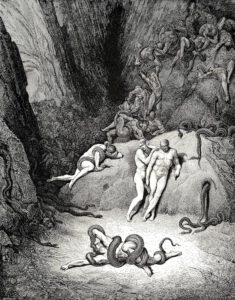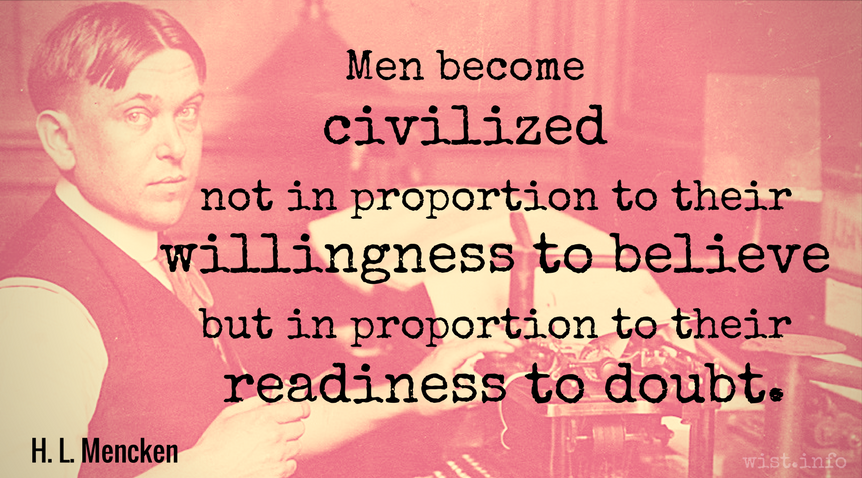If, dear Reader, what I tell you throws
you into disbelief, it’s no surprise —
I scarcely credit it myself, God knows,
and I was there.[Se tu se’ or, lettore, a creder lento
ciò ch’io dirò, non sarà maraviglia,
ché io che ’l vidi, a pena il mi consento.]Dante Alighieri (1265-1321) Italian poet
The Divine Comedy [Divina Commedia], Book 1 “Inferno,” Canto 25, l. 46ff (25.46-48) (1309) [tr. Carson (2002)]
(Source)
Dante is gobsmacked over a serpent/lizard biting a thief, and each of their bodies changing into the other. He spends the rest of the canto in detailed description of the transformation.
(Source (Italian)). Alternate translations:
If, Reader, you are tardy to believe
What I shall say, it will no wonder raise;
For I who saw it scarcely give assent.
[tr. Rogers (1782), l. 42ff]
Nor marvel, ye that hear the wondrous tale!
If doubts, arising oft, your minds assail!
Those eyes, that saw them, scarce believ'd the sight.
[tr. Boyd (1802), st. 8]
O reader! now
Thou be not apt to credit what I tell,
No marvel; for myself do scarce allow
The witness of mine eyes.
[tr. Cary (1814)]
If, reader, thou should'st tardily receive
What now I tell, it might not much surprise,
When I, who saw it, scarce myself believe.
[tr. Dayman (1843)]
If thou art now, O Reader, slow to credit what I have to tell, it will be no wonder: for I who saw it, scare allow it to myself.
[tr. Carlyle (1849)]
And if thou, reader, to believe art slow,
What I shall tell, 'twill be by no means strange,
For I who saw it must suspect the change.
[tr. Bannerman (1850)]
If, reader, thou art backward to believe
What I shall say, no wonder thou shouldst doubt,
For I myself who saw can scarce believe.
[tr. Johnston (1867)]
If thou art, Reader, slow now to believe
What I shall say, it will no marvel be,
For I who saw it hardly can admit it.
[tr. Longfellow (1867)]
If thou art now, reader, slow to believe that which I am going to say, it will be no marvel, for I who saw it hardly allow it to myself.
[tr. Butler (1885)]
If now, O reader, thou shouldst scarce be bent
To trust my speech no marvel it will be,
Since I who saw it scarcely can consent.
[tr. Minchin (1885)]
If thou art now, Reader, slow to credit that which I shall tell, it will not be a marvel, for I who saw it hardly admit it to myself.
[tr. Norton (1892)]
If, Reader, thou art now slow to believe what I shall tell thee, it were no thing to wonder at, for I that saw it can scarce admit its truth.
[tr. Sullivan (1893)]
If thou art slow, now, reader, at believing
What I shall say, it will not be a marvel,
For I, who saw it, scarcely do accept it.
[tr. Griffith (1908)]
If, reader, thou art now slow to credit what I shall tell, it will be no wonder, for I who saw it scarcely admit it to myself.
[tr. Sinclair (1939)]
If thou art slow of faith, thou who dost read
What I shall tell, 'tis nothing for surprise.
Since half I doubt, I who witnessed it indeed.
[tr. Binyon (1943)]
Reader, if thou discredit what is here
Set down, no wonder; for I hesitate
Myself, who saw it all as clear as clear.
[tr. Sayers (1949)]
Reader, should you doubt what next I tell,
it will be no wonder, for though I saw it happen,
I can scarce believe it possible, even in Hell.
[tr. Ciardi (1954)]
If, reader, you are now slow to credit that which I shall tell, it will be no wonder, for I who saw it do scarcely admit it to myself.
[tr. Singleton (1970)]
Now if, my reader, you should hesitate
to believe what I shall say, there's little wonder,
for I, the witness, scarcely can believe it.
[tr. Musa (1971)]
If, reader, you are slow now to believe
what I shall tell, that is no cause for wonder,
for I who saw it hardly can accept it.
[tr. Mandelbaum (1980)]
If you now, reader, are slow to believe
What I shall tell you, it will be no wonder
For I who saw it can scarcely credit it!
[tr. Sisson (1981)]
Reader, if you are slow
To credit what I tell you next, it should
Be little wonder, for I who saw it know
That I myself can hardly acknowledge it
[tr. Pinsky (1994), l. 44ff]
If now, reader, you are slow to believe what I say, that will be no marvel, for I, who saw it, hardly allow it.
[tr. Durling (1996)]
Reader, if you are slow to credit, now, what I have to tell, it will be no wonder, since I who saw it, scarcely credit it myself.
[tr. Kline (2002)]
If you are slow, my reader, to receive,
in faith, what I'll say now -- no miracle.
I saw it all, and yet can scarce believe.
[tr. Kirkpatrick (2006)]
If, reader, you are slow to credit
what I'm about to tell you, it's no wonder:
I saw it, and I myself can scarce believe it.
[tr. Hollander/Hollander (2007)]
Now, readers all,
If you cannot quite believe my story,
I find it hard, and I'm the one who saw it.
[tr. Raffel (2010)]
If you are slow
To credit, reader, what I tell you now,
No wonder. I, who saw it to be so,
Scarcely believe it still.
[tr. James (2013)]
Quotations about:
incredulity
Note not all quotations have been tagged, so Search may find additional quotes on this topic.
Only puny secrets need protection. Big discoveries are protected by public incredulity.
Marshall McLuhan (1911-1980) Canadian philosopher, communication theorist, educator
Take Today: The Executive as Dropout, ch. 2 (1972)
(Source)
Men become civilized not in proportion to their willingness to believe but in proportion to their readiness to doubt.
H. L. Mencken (1880-1956) American writer and journalist [Henry Lewis Mencken]
“What I Believe,” sec. 4, Forum and Century (Sep 1930)
(Source)
All men profess honesty as long as they can. To believe all men honest would be folly. To believe none so is something worse.
John Quincy Adams (1767-1848) US President (1825-29)
Letter to William Eustis (22 Jun 1809)
(Source)
Don’t you believe in flying saucers, they ask me? Don’t you believe in telepathy? — in ancient astronauts? — in the Bermuda triangle? — in life after death?
No, I reply. No, no, no, no, and again no.
One person recently, goaded into desperation by the litany of unrelieved negation, burst out “Don’t you believe in anything?”
“Yes”, I said. “I believe in evidence. I believe in observation, measurement, and reasoning, confirmed by independent observers. I’ll believe anything, no matter how wild and ridiculous, if there is evidence for it. The wilder and more ridiculous something is, however, the firmer and more solid the evidence will have to be.”
Isaac Asimov (1920-1992) Russian-American author, polymath, biochemist
The Roving Mind (1983)
See Carl Sagan.









